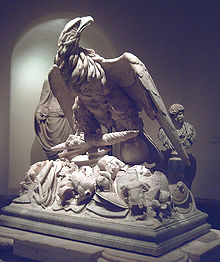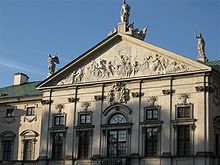- Marcus Valerius Messalla Corvinus
-
Marcus Valerius Messalla Corvinus (64 BC - AD 8) was a Roman general, author and patron of literature and art.
Contents
Family
He was the son of politician Marcus Valerius Messalla Niger (consul 61 BC)[1] Although, some dispute his parentage and claim another descendant of Marcus Valerius Corvus to be his father.
Messalla Corvinus is believed to have been married twice. His first marriage was to a Calpurnia, possibly the daughter of Marcus Calpurnius Bibulus, and from this first marriage, he had two children: a daughter called Valeria Messalina, who may have been the paternal grandmother of Roman Empress Statilia Messalina, and a son called Marcus Valerius Messalla Messallinus, who was a Roman consul in 3 BC. Messalla Corvinus' second son, Marcus Aurelius Cotta Maximus (consul 20 AD), is believed to have been born to a second unknown wife on the basis of a 23-year gap between the consulship of the elder son, Marcus Valerius Messalla Messallinus and the consulship of the younger son, Marcus Aurelius Cotta Maximus.[2]
Valeria, a female relative of Corvinus, perhaps a sister, married the Roman consul Quintus Pedius (a maternal cousin to Roman Emperor Augustus). Valeria and Pedius had a son called Quintus Pedius Publicola, who was an orator. His great nephew was the deaf painter Quintus Pedius.
It is common for some historians to refer to Marcus Valerius Corvinus and attribute the triumph against the Aquitani, the victory at Messana and the epithet Corvinus to him, when in actuality they are referring to three different generations of men named Valerius Corvinus: Marcus Valerius Messalla Corvinus born 64BC, Manius Valerius Maximus Corvinus Messalla consul 263BC (birthdate unknown), and Marcus Valerius Corvus born 370BC. How and why the name changed from Corvus to Corvinus is unclear. Also, to add to the confusion, Manius is sometimes referred to as Marcus.[3]
Life
Messalla Corvinus was educated partly at Athens, together with Horace and the younger Cicero. In early life he became attached to republican principles, which he never abandoned, although in later life he avoided offending Caesar Augustus by not mentioning them too openly.
In 43 BC he was proscribed, but managed to escape to the camp of Brutus and Cassius. After the Battle of Philippi (42 BC) he went over to Antony, but subsequently transferred his support to Octavian.
In 31 BC Messalla was appointed consul in place of Antony, and took part in the battle of Actium. He subsequently held commands in the East, and suppressed the revolted Aquitanians; for this latter feat he celebrated a triumph in 27.
Messalla restored the road between Tusculum and Alba, and many handsome buildings were due to his initiative.
He moved that the title of pater patriae should be bestowed upon Augustus, and yet resigned the appointment of Prefect of the city after six days’ tenure of office in 25 BC, because it was opposed to his ideas of constitutionalism. It may have been on this occasion that he uttered the phrase "I am disgusted with power".[4]
Patronage and writings
His influence on literature, which he encouraged after the manner of Maecenas, was considerable, and the group of literary persons whom he gathered round him—including Tibullus, Lygdamus and the poet Sulpicia--has been called "the Messalla circle." With Horace and Tibullus he was on intimate terms, and Ovid expresses his gratitude to him as the first to notice and encourage his work.’ The two panegyrics by unknown authors (one printed among the poems of Tibullus as iv. 1; the other included in the Catalepton, the collection of small poems attributed to Virgil) indicate the esteem in which he was held.
Messalla was himself the author of various works, all of which are lost. They included Memoirs of the civil wars after the death of Caesar, used by Suetonius and Plutarch; bucolic poems in Greek; translations of Greek speeches; occasional satirical and erotic verses; essays on the minutiae of grammar.
As an orator, he followed Cicero instead of the Atticizing school, but his style was affected and artificial. Later critics considered him superior to Cicero, and Tiberius adopted him as a model.
Late in life he wrote a work on the great Roman families, wrongly identified with an extant poem De progenie Augusti Caesaris which bears the name of Messalla, but in fact is a 12th-century production.
Places associated with Messalla
 The so-called Apotheosis of Claudius, the top part of an Augustan-era funerary monument that may once have contained Messalla's funerary urn. Found in a country villa at Marino once owned by C. Valerius Paulinus, a descendant of Messalla Corvinus, it is now in the Museo del Prado in Madrid.[5]
The so-called Apotheosis of Claudius, the top part of an Augustan-era funerary monument that may once have contained Messalla's funerary urn. Found in a country villa at Marino once owned by C. Valerius Paulinus, a descendant of Messalla Corvinus, it is now in the Museo del Prado in Madrid.[5]
Messalla had a house on the Palatine in Rome that used to belong to Marc Antony before Augustus presented it to Messala and Agrippa (Cass. Dio 53.27.5).
An inscription (CIL 6.29789 = ILS 5990) also records Messalla as the owner of the famed Gardens of Lucullus (Horti Luculliani) located on the Pincian Hill where the Villa Borghese gardens are today.
The Casale Rotondo, a cylindrical tomb near the sixth milestone on the Appian Way, is often identified as being the tomb of Messalla Corvinus, but this is debatable.[6]
Messalla is also recorded in an inscription as being one of the three friends of Gaius Cestius responsible for erecting statues that once stood at the site of the famous Pyramid of Cestius which is located close to the Porta San Paolo in Rome.
Legendary ancestor of Hungarian Royalty
The Wallachian-Hungarian family of Corvin, which came to prominence with Janos Hunyadi and his son, Matthias Corvinus Hunyadi, King of Hungary and Bohemia, claimed to be descended from Messalla.
This was based on the assertion that he became a big landowner on the Pannonian-Dacian frontiers, the future Hungary and part of Romania, that his descendants continued to live there for the following 1400 years, and that the Hunyadis were his ultimate descendants - for which there is scant if any historical evidence. The connection seems to have been made by Matthias' biographer, the Italian Antonio Bonfini, who was well-versed with the classical Latin authors.
Bonfini also provided the Hunyadis with the epithet Corvinus. This was supposedly due to a case in which the tribune, Marcus Valerius Corvus in 349BC,while on the battlefield accepted a challenge to single combat issued to the Romans by a barbarian warrior of great size and strength. Suddenly, a raven flew from a trunk, perched upon his helmet, and began to attack his foe's eyes with its beak so fiercely that the barbarian was blinded, and the Roman beat him easily. In memory of this event, Valerius' agnomen Corvinus (from Corvus, "Raven") was interpreted as derived from this event. The Hunyadis called themselves "Corvinus" and had their coins minted displaying a "raven with a ring". This was later taken up in the coat of arms of Polish aristocratic families connected with the Hunyadis, and also led to Marcus Valerius Messalla Corvinus' triumph over the Aquitanians(27BC)being commemorated in the pediment of the Krasiński Palace in Warsaw.
References
- ^ Syme, R., Augustan Aristocracy, pp. 230 f.
- ^ Syme, R., Augustan Aristocracy, pp. 230 f.
- ^ Charles Anthon, A Classical Dictionary (Harper, 1848), p. 1370.
- ^ J.P. Sullivan (ed), Apocolocyntosis (Penguin, 1986) note 44. ISBN 978-0-14-044489-6
- ^ Stephan F. Schröder, Katalog der antiken Skulpturen des Museo del Prado in Madrid. Vol. 2: Idealplastik. Mainz: von Zabern, 2004, cat. 206
- ^ The excavator, Luigi Canina, deduced from a small piece of inscription with the name "Cotta" that the monument had been built by M. Aurelius Cotta Messallinus for his father, M. Valerius Messalla Corvinus, but this inscription and other architectural fragments are now assumed to have come from a smaller monument at the site, and they may have nothing to do with Messalla Corvinus, cf. L. Grifi, "Sopra la iscrizione antica dell auriga scirto", Diss. del. Acc. Rom., Rome 1855, pp. 491ff. [1]; M. Marcelli, "IV MIGLIO, 14. Casal Rotondo", in: Susanna Le Pera Buranelli & Rita Turchetti, edd., Sulla Via Appia da Roma a Brindisi: le fotografie di Thomas Ashby: 1891-1925, Rome: L'Erma di Bretschneider, 2003, p. 77
 This article incorporates text from a publication now in the public domain: Chisholm, Hugh, ed (1911). Encyclopædia Britannica (11th ed.). Cambridge University Press.
This article incorporates text from a publication now in the public domain: Chisholm, Hugh, ed (1911). Encyclopædia Britannica (11th ed.). Cambridge University Press.- Monographs by L. Wiese (Berlin, 1829), J. M. Valeton (Groningen, 1874), L. Fontaine (Versailles, 1878); H. Schulz, De MV aetate (1886); "Messalla in Aquitania" by J. P. Postgate in Classical Review, March 1903; WY Sellar, Roman Poets of the Augustan Age. Horace and the Elegiac Poets (Oxford, 1892), pp. 213 and 221 to 258; the spurious poem ed. by R. Mecenatë (1820).
See also
- Ślepowron coat of arms
- Korwin coat of arms
- Matthias Corvinus of Hungary
- online extracts from Ronald Syme, The Augustan Aristocracy, Clarendon Press OUP, 1986
Preceded by
Gnaeus Domitius Ahenobarbus and Gaius SosiusConsul of the Roman Republic
with Imperator Caesar Augustus
31 BCSucceeded by
Imperator Caesar Augustus and Marcus Licinius CrassusCategories:- 64 BC births
- 8 deaths
- Julio-Claudian Dynasty
- Valerii
- Ancient Roman generals
- Patrons of literature
- 1st-century BC Romans
- 1st-century Romans
- Urban prefects of Rome
Wikimedia Foundation. 2010.


